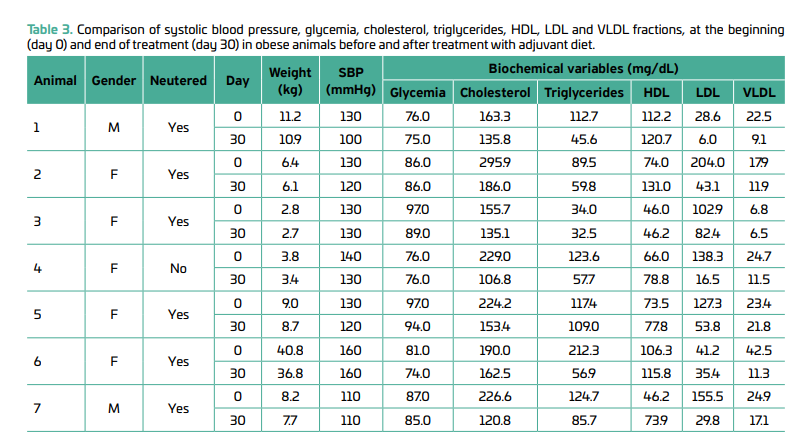Evaluation of the occurrence of metabolic syndrome in obese dogs and the role of caloric restriction diet as an adjuvant therapy
DOI:
https://doi.org/10.21708/avb.2022.16.4.10960Resumo
Metabolic syndrome, or metabolic dysfunction related to obesity in dogs, is a set of factors that may predispose comorbidities secondary to obesity. Adjuvant therapy with an energy-restricted diet, especially with low levels of carbohydrate and fat, is essential for weight loss, in addition to controlling snacks intake. The aim of this study was to evaluate the biochemical profile of obese dogs compared to lean dogs, and also to compare these profiles before and after a 30-day treatment, thus evaluating the possibility of obesity-related metabolic dysfunction and the action of adjuvant dietary therapy in this condition. Cholesterol and its fractions (HDL, LDL and VLDL), triglycerides, systemic blood pressure and glycemia of obese and lean dogs were measured, and seven obese dogs were treated only with a low-calorie diet with low levels of fat and carbohydrates for 30 days; these patients were evaluated before and after treatment. Obese dogs showed higher levels of triglycerides than lean dogs, and dogs treated with low-calorie diet presented weight loss and better outcomes related to biochemical profile, especially triglycerides levels, after treatment.
Downloads

Downloads
Publicado
Edição
Seção
Licença
Copyright (c) 2022 Acta Veterinaria Brasilica

Este trabalho está licenciado sob uma licença Creative Commons Attribution 4.0 International License.
Autores que publicam na Acta Veterinaria Brasilica concordam com os seguintes termos: a) Autores mantém os direitos autorais e concedem à revista o direito de primeira publicação, com o trabalho simultaneamente licenciado sob a Licença Creative Commons Attribution que permite o compartilhamento do trabalho com reconhecimento da autoria e publicação inicial nesta revista. b) Autores têm autorização para assumir contratos adicionais separadamente, para distribuição não-exclusiva da versão do trabalho publicada nesta revista (ex.: publicar em repositório institucional ou como capítulo de livro), com reconhecimento de autoria e publicação inicial nesta revista. c) Autores têm permissão e são estimulados a publicar e distribuir seu trabalho online (ex.: em repositórios institucionais ou na sua página pessoal) a qualquer ponto antes ou durante o processo editorial, já que isso pode gerar alterações produtivas, bem como aumentar o impacto e a citação do trabalho publicado (Veja O Efeito do Acesso Livre).


 Esta obra está licenciada com uma Licença
Esta obra está licenciada com uma Licença 